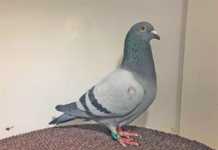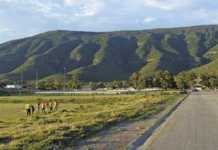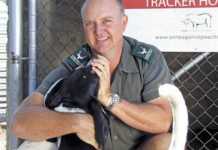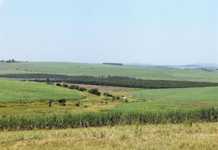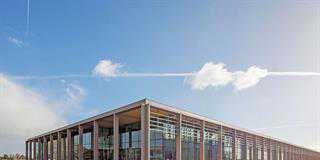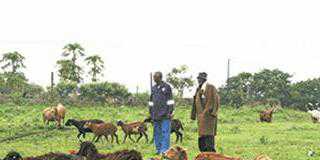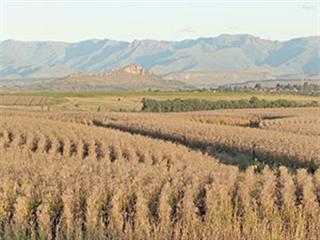
Today, downtown Ficksburg is like any other African border town, with hooting taxis, seedy bars and opportunists lining the streets. By contrast, the Ficksburg Bridge border post across the Caledon River – the historical and natural border with Lesotho – seems a fairly efficient affair, with high diamond mesh fences behind which uniformed policemen wave cars to checkpoints.
The problem is that it’s all a bit of a charade, considering that those not wishing to utilise the official crossing simply wade through the shallow Caledon which separates the entire Ficksburg district from Lesotho. “It’s easy to cross when there’s no rain,” says a Lesotho national who did not wish to be named or photographed. “Everybody is crossing.”
Fight for justice
A major problem for farmers of the region is that many of these illegal crossings result in brutal crime, according to James Brown of a private Ficksburg security company. Brown was forced to shoot dead a tractor thief who turned on him in the Bamboesberg area, and was the first to find the badly beaten, stabbed and lifeless body of farmer Dr Ernest Giesekke near the tiny settlement of Gumtree in January 2010.
“Lovely old toppie,” he recalls with a smile. “Unfortunately people in Ficksburg must pay to protect themselves because the state is unable to.” It is exactly for this reason that Free State Agriculture (FSA) dragged the state to court concerning their constitutional obligation to protect farmers along the Lesotho border. “Farmers cannot farm on the border any longer if their property is not protected” says Kobus Breytenbach, FSA vice-president and chairperson of Agri SA’s Rural Safety Committee. The only request we have had as organised agriculture is that we want an environment where the farmer can produce food and farm.”
Led by legendary human rights lawyer, George Bizos, the FSA’s legal team persuaded the High Court in Bloemfontein in mid-2010 to transform an agreement between the FSA and the state (which included various state departments) into a court order to force the state into action along the Lesotho border. Important issues raised in the court order included the erection of a border fence and the development of a patrol road to accommodate security services.
The state returned the SANDF to the border in 2011, 50km of patrol road was created, and 110km of fencing in the southern Free State was put up. But this was subsequently vandalised, and the FSA felt that the state was dragging its feet. A contempt of court application was therefore made on 19 January 2012. The seriousness of such an application eventually stirred President Jacob Zuma himself, says Breytenbach.
“The president approached our lawyers through his legal team to ask for time to discuss whether it would be possible to keep this contempt of court application out of court,” he says. “We thought that if the head of state was requesting this, we should listen to what he wanted to say.”
However, despite the withdrawal of the application and negotiations that led to a final settlement signed on 31 August 2012, the Ficksburg region still has no proper border fence or road, while crime continues to flourish. Moreover, the state has already failed to meet specific obligations by mutually agreed deadlines, according to Breytenbach. “We are going to be led by our legal team, and if necessary we will not hesitate to begin another application for contempt of court,” he says.
Another Murder
Recently murder returned to the area of Harmonia when Chris Preece (54) was murdered on the farm Fleur de Lis in November 2012. Today a sign still points to the farm homestead below a koppie where the UK citizen wanted to establish an eco-tourism venture. Instead, he was hacked to death by panga- and knife-wielding assailants, while his wife was so badly assaulted she was left with a fractured skull.
Fleur de Lis borders the farm Stolberg where Farmer’s Weekly visited Xavier Moll in 2008 after he had narrowly escaped being executed by heavily armed men during a house invasion. His father Jacques (64) was not so lucky and was shot dead on the veranda. “The problem on this border is that for whatever reason, your life is worth less than R5. If you get in their way, they will kill you – they have no qualms about it,” says Friedel von Maltitz, chairperson of the Harmonia Farmers’ Association. “Never mind if we are patrolling or controlling the traffic, there is no border – that is the problem.”
It was after Moll’s murder that farmers realised just how vulnerable they were on the platteland and a local security plan was put in place within the structures of Free State Agriculture’s Rural Safety Plan, which involved farmers’ associations, private security firms and the SAPS. The unsettling reality is the knowledge that the security plan – complete with a central command post in a Ficksburg suburban home, an informant network, white light patrols and trained civilian response teams – is simply filling a security vacuum left by the SAPS.
“I think it works well and at the moment it’s the only structure we have,” says Friedel. “No system is perfect, but it’s always better than a broken system.” Although he is delighted that the SANDF has returned, he says that to protect the area properly they need a massive number of troops because the border simply does not exist.
Living in fear
“I think it’s better that you don’t take my photo,” says a leading emerging farmer from Ficksburg. “The criminals will come and cut my throat.” The elderly farmer, who also prefers not to be named, explains that Ficksburg crime is linked to a general disrespect for crumbling law-enforcement structures.
“In previous years – in die boere se tyd – there weren’t people walking around on our land and crossing the border. There was security. If you went to steal somebody’s stuff you felt as if there was an umbrella in the sky that could see you. At the moment there is nothing like that – our security is very poor.” Stock theft is of particular concern to him as he has been a frequent victim, with one of his worst experiences occurring last year.
“Thirty-three sheep skins from my sheep were found at the old airport near Ficksburg and the meat was already gone,” he says. “The lambs were obviously a problem because the thieves cut their throats and left them alongside the road – 16 of them.” He is concerned that stock theft seems to be more organised, with increasing co-operation between South African and Lesotho nationals on either side of the Caledon.
“The location people (from Meqheleng township) can’t really steal and chase the livestock the way the people from the other side can. So the people on this side with money hire Lesotho nationals to steal for them.” Despite living in town, he spends every night between 9pm and 4am on the farm protecting his sheep, cattle and maize. “If you have something, thieves will steal it. It’s better that you have nothing because then you will live in peace. “Farmers are going to become moedeloos and leave. Do you think my children are going to go back to the farm after they saw how I struggled?”
Adapting to crime
It was 2007 when Farmer’s Weekly visited the farm Sekonyela near Ficksburg to interview Pieter Vermooten about the challenges of farming along the Lesotho border. Just weeks later, he was shot dead in his home. Soon afterwards, his son Hennie returned to farm. Farmer’s Weekly interviewed him in 2008 and again recently, only to find that the security situation in the region is as dire as ever, and has affected his farming operations profoundly.
A flock of more than 1 000 ewes once owned by his father has been reduced to two sheep kept for slaughter, and even these are kept behind six-foot electric fencing. Almost 90% of the farm, which was once dominated by maize, has been transformed to no-till soya bean because of the systematic theft of maize. Hennie also gave up his dairy due to stock theft and has demolished a number of buildings that were being vandalised.
“I am so gatvol of adapting,” he says. “I just want peace.” In addition to these production losses, there is the sheer misery of living in fear. “You’re always looking up, always watching.” says Hennie. “If the dogs bark, you wonder if something is wrong. “I don’t want Pieter, my son, to have to cope 20 years from now with what I’m dealing with today.”
More farm attacks in and around the Ficksburg district
In late December 2010 and again in September 2011, an elderly couple, Willem and Anne Serfontein, were viciously attacked and robbed in their home on a Ficksburg farm. Also in 2011, farm managers Sean Schutte (36) and his brother
Louis (33) pursued what was believed to be armed men to the Caledon River in the neighbouring district of Ladybrand. They were ambushed and Sean was shot and killed; Louis was wounded but survived. In October 2012, in the Rosendal district near Ficksburg, Frans van Dyk and his wife Susan (both in their 60s) were attacked on their farm, tied up and robbed of money and weapons.
Sandstone Estates and the Lesotho border
Sandstone Estates is not only an impressive agricultural venture, but also home to a world-class heritage centre that displays a wide cross-section of machinery from a bygone era. Driving through lands of maize towards an SANDF camp overlooking the Caledon, Sandstone Estates director Wilfred Mole says that the security situation deteriorated rapidly along the border when the SA Police Services took over control in 2007.
It was not unusual for large numbers of Lesotho nationals to steal crops and for cattle to be herded over the border to graze. Often these cattle were protected by ‘guards’, armed with automatic weapons, who would challenge any private security personnel coming to intervene.
A symbol of this dark period can still be seen in the form of a once well-equipped SAPS command post on Sandstone Estates that was first looted by thieves before being abandoned by the police. “We naturally put our faith in the police but in fact they were ineffectual,” explains Mole. Although the estate employs a team of private security guards, it has been the return of the SANDF that has improved security radically.
“Two years ago, unless I had set up a massive security operation, there would have been no maize here,” he says, pointing out the cultivated lands on a ridge overlooking the Caledon valley. “The reason that the army is 100% more effective is that they always patrol along this border. “The SAPS only makes infrequent visits and obviously that is not the way to mount a security operation.”
The military and the Lesotho border
According to an SANDF source, there is currently a battalion headquarters managing the deployment of two companies in the Eastern Free State region (this amounts to approximately 360 SANDF staff). Although the return of the army to the Lesotho border in 2011 (replacing the SAPS that took over control of the border in 2007) is seen as a major victory by the FSA for security in the region, Breytenbach is adamant that the current number of troops is insufficient.
The border stretches for more than 480km, between Zastron in the south and Clarens in the north, and not all SANDF soldiers can patrol this stretch at once. The need to rotate troops and the presence of administrative staff makes the actual number more thinly spread than one might think. Breytenbach believes at least 1 000 troops are needed on the border.
Contact Agri SA on 012 643 3400.

